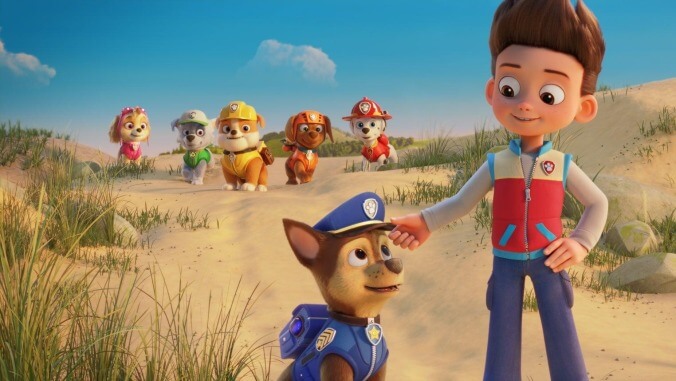The interminable PAW Patrol movie will make parents howl for release
As a feature film, the unsettling children's television phenomenon is well outside its jurisdiction

Just as Gotham City exists in the shadow of the Batman and Metropolis lives in thrall of Superman’s do-gooding, the landscape of Adventure Bay—a fictional, animated, possibly Canadian municipality—is dominated by the PAW Patrol, a team of talking puppies trained to serve and protect their adoring public. Their public, in turn, has been trained to rely almost exclusively on the pups’ seemingly private security firm, run by Ryder (Will Brisbin), a 10-year-old boy whose autonomy suggests extremely loose child emancipation laws in Adventure Bay. In PAW Patrol: The Movie, a feature adaptation of the children’s television sensation, Ryder and the pups relocate to Adventure City, where Ryder has already constructed a high-tech tower to loom over the skyline. This change only raises further questions about the PAW Patrol’s official jurisdiction, but Ryder does finally reveal the source of his income: The new tower was funded by officially licensed PAW Patrol merchandise that, he reports with a wink, sells like hotcakes.
Judging from its bizarre interpretations of federal and local law, PAW Patrol takes place in an alternate universe. But then, so does most kid-targeted media that no unaccompanied adults would ever watch. Shows like PAW Patrol don’t provide a warm common ground for kids and their caregivers; they exist to transport younger viewers into a zone of distraction. It’s a form of benign neglect that many parents must employ on occasion, and with the advent of streaming video on demand (combined with a theatrical option that’s off the table for plenty of families), a feature version of an eight-year-old series feels a bit redundant. As a babysitter, the movie’s not much different than a brief marathon of episodes. As a family bonding experience, it may qualify for adults as a mild form of psychological torture, presenting storylines that feel ready to wrap up at the 15-minute mark and then must continue on for another hour. (The official running time of 88 minutes includes a generous helping of cookie-less end credits.)
Adults and children alike might feel this disorientation thanks to their own training in the rigidity of the PAW Patrol formula: The pups frolic off the clock; something goes wrong in Adventure Bay, often but not always caused by the venal, preening Mayor Humdinger (Ron Pardo) of neighboring Soggy Bottom; someone calls Ryder, who assembles his pups; and between two and six dogs are sent out to save the day using their toys, er, vehicles and gear. For the movie, Humdinger sets his sights on a grander stage, mysteriously winning the Adventure City mayorship in the face of an indifferent populace. When Ryder and the team set off to stop his various schemes, “police” canine Chase (Iain Armitage), usually the most insufferably steadfast of the group, reveals his haunted backstory involving abandonment on the city streets. Other team members Rubble, Marshall, Skye, Rocky, and Zuma are consigned to background status, to better reassure Chase that self-confidence alone should be enough for him to successfully perform dangerous feats of strength.
Chase’s entirely justifiable crisis of confidence loosely entwines with the story of Liberty (Marsai Martin), a city-dwelling dog with a vast desire to assist the PAW Patrol. (She’s initially met with icy lack of acknowledgment from a cruelly withholding Ryder.) Watching a new pup potentially get inducted into the PAW Patrol will be an exciting and unprecedented development for any viewers who somehow missed the various episodes introducing auxiliary members like Everest, Tracker, Rex, Ella, Tuck, Robo-Dog, and Wild Cat, all unaccounted for in the movie. Hell, Skye (Lilly Bartlam), the one original female member of the core team, gets repeatedly shunted aside so that Liberty can direct traffic and Chase can make death-defying jumps—despite the fact that Skye pilots a goddamn helicopter.
Everything looks a bit shinier: The cheap-looking animation of the TV show has undergone a substantial cute-ification process, enough of an upgrade that it could pass muster in a Disney feature from the mid-to-late 2000s. But reaching the artistic heights of a mediocrity like Bolt would be a spectacular achievement for the PAW Patrol, both in terms of personality (which mostly involves the pups politely chuckling at each other’s wan jokes) and motion (which still feels a bit logy, as if the filmmakers are still adjusting to the revelation that animation need not be purely functional). Unsurprisingly, the film version feels most energized when it’s amping up to sell toys: fetishizing the clicking of plastic into plastic, and supersizing the characters’ armor and vehicles with a deranged zeal matched only by real police departments around the country.
The movie also exacerbates a strange side effect of the show, which is that Mayor Humdinger becomes its most interesting character by default, with voiceover artist Pardo’s audible sneers outshining celeb cameos from the likes of Randall Park, Dax Shepard, Jimmy Kimmel, and Kim Kardashian. Humdinger is a potent combination of old-timey political bluster (he’s got a bushy mustache and an endless supply of top hats) and contemporary arrogance, combined with a familiar, perpetual dissatisfaction and disgust with what he sees as his lowly constituents. “I’m an unqualified elected official,” he says at one point. “What’s the worst that could happen?” It’s an amusing little jab, but as with all things PAW Patrol, the answer isn’t entirely clear. Even the feature film only vaguely implies that Humdinger might be arrested—by an organization with no governmental oversight, no less—for his litany of crimes, in lieu of the light scolding he typically receives on television. Its simultaneous ribbing, forgiving, and forgetting of its Trumpian villain is just one more way that PAW Patrol: The Movie may actually be perfectly suited to the current mass-media conditions. It trains its young audience to expect a bunch of consequence-free content that blurs the line between narrative and perpetual distraction, then leaves them wanting more.